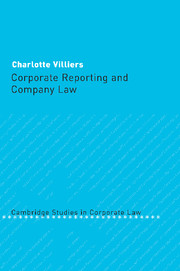Book contents
- Frontmatter
- Contents
- Preface
- Table of legislation
- Table of cases
- Introduction
- PART I GENERAL ISSUES
- 1 Disclosure theory and the limitations of corporate reports
- 2 The regulatory framework
- 3 Persons responsible for presenting corporate reports and information
- 4 Users of corporate reports
- 5 The Companies Register
- PART II FINANCIAL REPORTING
- PART III NARRATIVE REPORTING
- PART IV A WAY FORWARD
- Bibliography
- Index
5 - The Companies Register
Published online by Cambridge University Press: 23 July 2009
- Frontmatter
- Contents
- Preface
- Table of legislation
- Table of cases
- Introduction
- PART I GENERAL ISSUES
- 1 Disclosure theory and the limitations of corporate reports
- 2 The regulatory framework
- 3 Persons responsible for presenting corporate reports and information
- 4 Users of corporate reports
- 5 The Companies Register
- PART II FINANCIAL REPORTING
- PART III NARRATIVE REPORTING
- PART IV A WAY FORWARD
- Bibliography
- Index
Summary
The role of Companies House
A key participant in the corporate information process in the UK is the Companies Registrar at Companies House, an executive agency of the Department of Trade and Industry. Indeed, a system of registration has existed in the UK since 1844. As well as incorporating and dissolving limited companies, Companies House describes its main functions as being to examine and store company information delivered under the Companies Act 1985 and related legislation and to make this information available to the public. Indeed, the role of Companies House is to meet one of the fundamental justifications for a disclosure regime, as is expressed by the DTI:
Corporate status confers privileges on companies, in particular in relation to taxation and, in the case of limited companies, limiting the liability to creditors of the members of the company (shareholders) to the amount of capital subscribed. In return for these privileges, third parties such as potential creditors (customers, suppliers, lenders, public authorities etc), shareholders and employees are entitled to access to basic information about the company, its directors and its assets to enable them to make informed judgements about its affairs, and the risk of entering into any dealings with the company.
Companies House is active in the receipt and processing of information for public access in three broad categories connected with the company's life.
- Type
- Chapter
- Information
- Corporate Reporting and Company Law , pp. 105 - 122Publisher: Cambridge University PressPrint publication year: 2006



